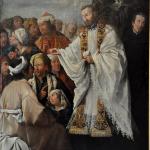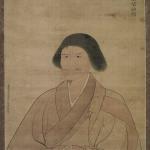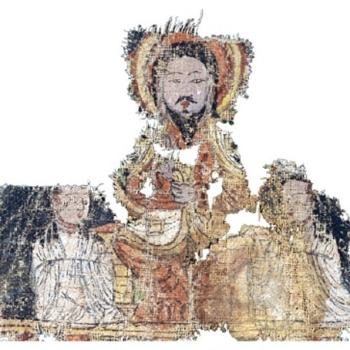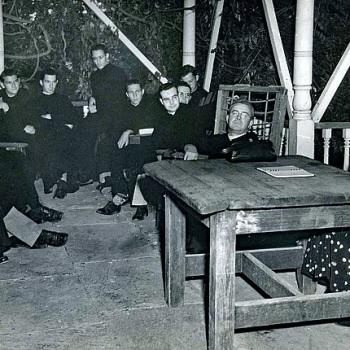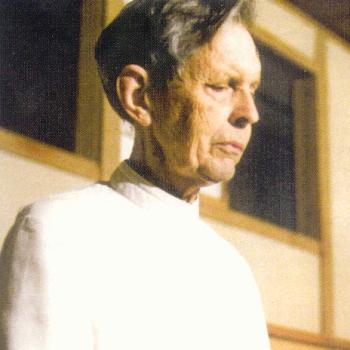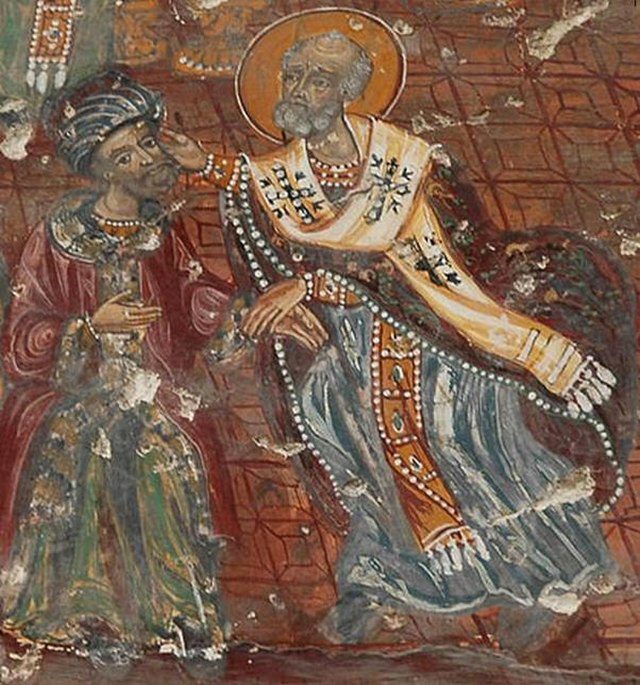
detail
of Icon at Soumela
December 6th is the feast of Saint Nicholas.
Somehow there’s a line drawn from this figure, a 4th century bishop of Myra, which is in Asia Minor, specifically, Turkey, and our elf Santa Claus.
Precious little is known of the actual Nicholas. Well, we know he was a bishop. And he was a controversialist in a historically fraught time for the Christian church. At what we know as the Council of Nicaea, which was held under the watchful eye of Constantine, Nicholas was one of the supporters of Athanasius as part of the contingent who supported the idea that the one God consisted of three persons.
A logically inconsistent thesis one might note and many often have noted.
Although it is also something with enormous poetic power. And which I think can be seen as pointing into the deep of mysterious reality.
Unless, that is, one is a literalist. One who only sees dead letters. A literalist who makes these things history, facts, flat, like ink. And with that then back to that observation about logic and, well…
Like Athanasius, Nicholas was a literalist.
And. However. The ink has several versions. There was an alternative view to the three in one view of God and with that Jesus’ relationship to God at that time in the early half of the fourth century. It held, with Judaism, that there is one God. However, with the wrinkle that it saw that Jesus had divine characteristics, such that calling him God was not without merit. But, in the bottom line of these things, he was subordinate to the Father.
It was the major alternative view, among others, but the big alternative view in that era.
The principal figure associated with this view, and who was present at the council was the priest Arius.
There could have been several views of the mystery that presented in the life and teachings of Jesus, as well as his death and the dream stories people spoke of him.
But the emperor liked it simple, one faith, one God, one emperor. I’m not at all sure he cared what orthodoxy should be, but he wanted an orthodoxy. And while the bishops and their theologians argued, the emperor’s troops were guarding their, well, shall we say, safety.
A draft creed was proposed to support the one in three view. In case you’re interested the vote was 318 for and 250 against. That creed was the first draft of what we now know as the Nicene Creed. Then. Under a lot of pressure, including Constantine’s soldiers, all but two of the bishops present signed the document.
Back to Nicholas. While the history, that is the factuality of the event is shrouded, but the story that is told over and over how in the heat of the debates Nicholas, our good old Saint Nick, physically assaulted Arius. Perhaps punching him in the face.
This assault is often celebrated as orthodoxy striking down heresy.
Me, I find it speaks to what is wrong with religions in general. And any sort of literalist approach to religion, specifically.
My thesis has two parts.
First, that while the primary purpose of religion is as that part of a culture dealing with identity and the culture’s cohesion. That is it defines and subtly enforces who is in the tribe and who is out. The council and the hovering presence of the emperor led to what has often been noted as “when Constantine invented Christianity.” Perhaps this moment in the early first half of the fourth century can be seen a primary example of that job of religion establishing clarity and with that cultural cohesion.
I have second part to my thesis, as well.
That is within religion there are other tasks beyond cultural order. Among them and most important to me there’s a mysterious and continuing concern with ultimacy. It’s an exploration of and a telling of our intimate experiences as human beings with life and death and meaning.
Think of it as the spiritual within religion.
At its best it is the wisdom of our ancestors told in stories.
It is slippery like an animal, and like an animal it lives and dies.
So, I have no argument with the one and three God. It dreams out something kind of lovely. He smells of that attempt to draw the deep wisdom. Rather like a dream.
But the death knell of that spiritual component is when it is when one insists on the historicity of the dream. That it is raw fact. When it becomes literal truth.
In my observation this position can never be supported. Because it comes from a different part of our humanness, it arises out of our hearts and comes to us in dreams.
So, when a literalist is confronted with any kind of alternative view we get Nicholas punching Arius. We get burnings and hangings and way worse things. The song of orthodoxy, of most kinds.
On the other hand the dream truths seem to persist. We kill them in favor of the literal and they spring to life. In spite of it all. In spite of the power of the state. In spite of the many kinds of violence against it. The song of the spiritual, of the deep, of the mystery that arises and comforts and sings into our hearts the true.
The spirit does seem to persist. So, the festival that’s coming, that one about the birth of Jesus defies the literalists. Ancient tails across the globe of the turning from the dark to light become part of the story. Other ancient European pagan celebrations of and trees lit with light become standard.
The universal mystery of birth, of a child coming into the world. There’s a dream. Slippery. Wet. Hard. And everyone present draws their breath and wonders. What does this birth portend?
For Christians it is possible to see in this festival of St Nicholas the one on the 6th of December the actual literalist position. But we must dream. And in the coming festivals of Christmas the power of the dream becomes reality. The really real.
The truest true.
One among several. Each offering the heart ways into the deeper matter.
I see it that way.
For me, a small wonder. And a joy…


